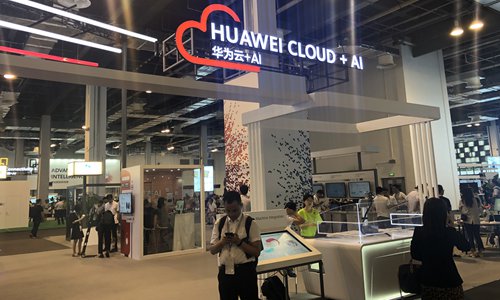HOME >> BUSINESS
US blame strategy toward China untenable
By Huang Yongfu Source:Globaltimes.cn Published: 2019/9/30 10:41:53

Visitors at the venue of Huawei Connect 2019 in Shanghai on Thursday. Photo: Shen Weiduo/GT
Huawei, the Chinese privately held technology star, launched the Mate 30 series in September, the bombshell smartphones with "fifth-generation" (5G) technology after being blacklisted by the US Commerce Department.
Such a development is an effective blow to one of the US government's toxic blames against China that Chinese firms are stealing their technologies and making arrogant claims that Chinese firms have no technology gems of their own to offer.
For more than a decade, the US has accused Huawei of intellectual property theft including stealing from T-Mobile US Inc. and violating US sanctions on Iran. The recent case is that the US filed criminal charges against a Chinese professor for stealing a US startup's technology for Huawei, which donated $100,000 to support related research at the university where the professor worked at.
Hawkish politicians and companies in the West constantly grumble about "forced technology transfer" via which Chinese rivals are pilfering their intellectual property, by fair means and foul. American officials have been frightening technology companies and university administrators with tales of Chinese spies.
For a developing country whose domestic firms are at a disadvantage, and unable to compete with foreign investors with advanced technologies, restrictive foreign direct investment (FDI) regimes to protect its "infant" industries are commonly introduced, such as the policy of linking market access to technology transfers.
Foreign companies seeking access to the Chinese market were required to set up joint ventures and share their technology with domestic partners in China. However, the transferred technology is typically included in the overall appraisal of a foreign investor's contribution to a joint venture, and followed by cheap land, infrastructure, tax exemptions, or loans on favorable terms provided by local governments eager to foster growth.
Actually, American and European companies are not forced, but motivated to invest in China by the expectation that the potential loss from sharing their technology will be far less than the expected gains from getting access to Chinese consumer markets, as confirmed by the high profitability of joint ventures.
In fact, cybersecurity issues don't just apply to 5G or a single company, but commonly exist in information and communication technology. Products made by US companies such as Cisco and Facebook were found to have planted backdoors while no backdoors were found in Huawei's products, according to a Daily Mirror report in May. The global community should be more cautious about cybersecurity risks for products made by US companies via which the US government has been traditionally conducting monitoring into foreign countries for ages.
China tech companies have directed vast resources and the sharpest minds to develop advanced indigenous technologies and capacity, which are likely to have an enduring effect on global supply chains.
Huawei is China's biggest high-tech company, seen as an epoch-making technology champion. Huawei holds many crucial patents on ultra-swift and ultra-coveted 5G mobile networks, which will soon connect everything from cars to industrial robots. 5G represents ultrafast speed and excellent connectivity. After Huawei introduced its Mate 30 model with 5G, Xiaomi Corp., Oppo and Vivo are expected to release 5G-capable devices before year-end.
Alibaba is China's dominant online retailer. It is expanding in nascent business in China of running computer systems and cloud businesses for other companies. Through its superfast networks called the Internet of Things (IOT), billions of sensors in everyday objects as microwave ovens and sneakers will be internet-connected.
Tencent is China's leading platform for social media. It continues to invest in cloud and software to enhance payment platforms, services and technologies, to better support its users and enterprise customers.
DeepBlue is actively developing its commercially viable self-driving technologies on the basis of AI capabilities. The company has emerged from selling its autonomous buses from domestic cities to the global marketplace. Apart from DeepBlue, Yutong, China's largest bus maker, and Baidu, a tech group partnered with King Long, are among the top Chinese companies to develop self-driving buses.
Over the past decades, China has leapfrogged from a laggard to a trail-blazer in both hard and soft visible technologies, and also invisible technologies, ranging from communication infrastructure (such as high-speed railway, aircraft, and shipping), e-commerce, mobile payments, facial-recognition, artificial intelligence, cloud computing and so on.
Not only are Chinese mainland innovators capable of cutting-edge inventions, they are also good at frugal engineering or cheap solutions that are more suitable for use in the developing economies.
Western firms have increasingly fancied Chinese technology and services which are in some cases unavailable elsewhere. To gain market share in China, they try to bolster their local distribution networks and gain a cutting-edge technology with research teams, patents and clients. And, some Western tech firms are buying Chinese rivals outright.
Date back to 2016, most acquisition deals involve niche industries such as makers of the powertrains and sensors for electric vehicles, or agencies managing social-media influencers. The trend of acquisition has taken root, even as animosity between the US and China has escalated.
The author is a senior fellow at ICC of the National Development and Reform Commission of China. bizopinion@globaltimes.com.cn
Posted in: EXPERT ASSESSMENT